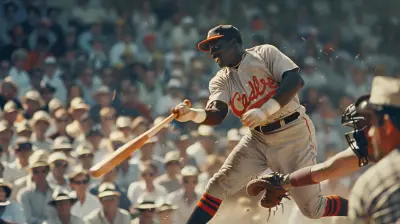Positive Reinforcement: The Key to Motivating Young Athletes
2 December 2024
If you've ever coached or been a parent to a young athlete, you know that motivation can sometimes be tricky. Some days, kids are fired up and ready to tackle any challenge thrown their way. Other days, getting them to put on their cleats or lace up their sneakers might feel like pulling teeth. So, how do you keep them motivated and engaged, both on and off the field? The answer might lie in a surprisingly simple concept: positive reinforcement.
Positive reinforcement is a game-changer when it comes to nurturing young athletes. By focusing on encouragement and rewarding good behaviors, you can help kids develop a love for sports that lasts a lifetime. But it’s not as simple as just saying “good job” and moving on. There’s a bit of an art to it. And, spoiler alert, it works way better than punishment or criticism.
In this article, we’re going to dive deep into the importance of positive reinforcement in youth sports, why it works so well, and how to apply it effectively as a coach or parent. Ready? Let’s go!

What is Positive Reinforcement?
Before we get into the nitty-gritty of applying it, let’s clarify what positive reinforcement actually is. In the simplest terms, positive reinforcement means rewarding good behavior to encourage it to happen again. It’s like training a puppy—when the puppy sits, you give it a treat. Over time, the puppy learns that sitting equals treats, so they sit more often.With kids, it’s not about tossing them treats (though, hey, snacks never hurt!). It’s about offering praise, recognition, or even small rewards when they do something well. The key is that the behavior you want to see more of—whether it’s effort, teamwork, or focus—gets positively reinforced.
Positive Reinforcement vs. Negative Reinforcement
You might be wondering, "What about negative reinforcement? Is that effective?" Negative reinforcement involves removing something unpleasant when a desired behavior occurs. For example, a coach might say, "If you hustle during practice, we’ll skip the extra sprints." While this can certainly motivate athletes in the short term, it often builds resentment over time. Kids start associating sports with avoiding discomfort rather than striving for success.Positive reinforcement, on the other hand, helps athletes focus on what they’re doing right instead of what they might be doing wrong. And, let’s face it, wouldn’t you rather be recognized for your efforts than be constantly reminded of your mistakes?

Why Positive Reinforcement Works So Well
You might be thinking, “Okay, I get it. But why does it work so well?” Let’s break it down:1. Boosts Confidence
When young athletes receive positive feedback, they start to believe in themselves. Confidence is like the fuel that drives young athletes to push themselves harder and tackle challenges head-on. It’s the difference between a kid who steps up to take the final shot and one who shies away from the moment.Imagine a child who’s learning to shoot a basketball. If, after several failed attempts, they finally make a shot and their coach says, “Great job! Keep it up, you’re improving!”—that child is much more likely to keep practicing. On the flip side, if no one acknowledges their effort, or worse, criticizes their form, they may start to feel discouraged and lose interest.
2. Encourages Effort Over Results
We all love winning, but the truth is, not every game is going to end in a victory. By emphasizing effort through positive reinforcement, you’re teaching young athletes that the process is just as important as the outcome. This helps them develop a growth mindset, where they learn that improvement comes from hard work, not just natural talent or luck.Instead of focusing solely on whether your child or athlete won or lost, try praising their perseverance, teamwork, or attitude. For example, “I saw how hard you worked out there today—keep it up!” This can leave a lasting impact on how they approach not only sports but other challenges in life.
3. Builds Stronger Relationships
Positive reinforcement strengthens the bond between athlete and coach (or parent). Kids are more likely to listen to someone they feel respects and values their hard work. When they know you’re on their side, they’ll be more open to feedback—even constructive criticism—because they trust that you have their best interests at heart.Imagine it like this: when a child is constantly met with criticism, they might start to shut down or become defensive. But if they know they’ll be recognized for their efforts, they’ll seek out your feedback, eager to improve.
4. Fosters a Love for the Sport
At the end of the day, we want kids to enjoy sports, right? Positive reinforcement helps foster a genuine love for the game. When young athletes feel supported and appreciated, they’ll associate sports with fun, learning, and growth—not pressure or fear of failure.This is especially important for kids who may not be naturally athletically inclined. Positive reinforcement helps them see that there’s a place for everyone in sports, regardless of skill level. It’s not always about being the fastest or strongest; it’s about doing your best and having fun.

How to Use Positive Reinforcement Effectively
Okay, so we know why positive reinforcement is so effective. Now, let’s talk about how to use it in a practical way. Whether you’re a coach, parent, or both, here are some tips for applying positive reinforcement in youth sports.1. Be Specific with Your Praise
When giving positive feedback, avoid generic statements like “Good job!” While it’s better than nothing, it doesn’t tell the athlete what they did well. Instead, be specific about what behavior you’re reinforcing. For example:- “I loved how you kept your head up and looked for your teammates during the game.”
- “That was an awesome pass! You really helped set up that goal.”
By being specific, you help the athlete understand exactly what they did well, making it more likely they’ll repeat the behavior in the future.
2. Praise Effort, Not Just Results
We touched on this earlier, but it’s worth repeating: focus on the effort, not just the outcome. Kids can’t always control whether they win or lose, but they can control how hard they try. When you praise effort, you’re teaching them that persistence and hard work are what really count.For example, instead of saying, “Great game, you won!” try saying, “I’m so proud of how hard you worked today. You never gave up, and that’s what made the difference.”
3. Use Reinforcement When It Matters Most
Timing is everything. Positive reinforcement is most effective when it’s given right after the behavior you want to reinforce. If you wait too long, the impact is diluted. Make sure to offer praise or encouragement immediately when you see something worth reinforcing.For instance, if a player makes a great defensive play during practice, don’t wait until the end of practice to acknowledge it. Give them a shout-out in the moment, so they know exactly what they did well.
4. Balance Praise with Constructive Feedback
While positive reinforcement is powerful, it’s also important not to go overboard with praise. Kids are smart—they can tell when you're being genuine and when you're just trying to make them feel good. Too much praise can sometimes come off as insincere or even patronizing.To avoid this, balance positive reinforcement with constructive feedback. For example:
- “You did a great job staying focused during the game. One thing I’d like you to work on is keeping your feet moving on defense. Let’s practice that this week.”
This way, you're still reinforcing the good behavior, but you're also offering helpful suggestions for improvement.
5. Create a Reward System
Sometimes, a little extra incentive can go a long way. Consider creating a simple reward system for your team or child. This doesn’t have to be anything elaborate—small rewards like stickers, certificates, or even verbal recognition during a team meeting can be highly motivating.For example, you could give out an “Effort Award” at the end of each practice to the player who worked the hardest or showed the most improvement. This creates a culture where kids are motivated to give their best effort, knowing it will be recognized.

Common Pitfalls to Avoid
As powerful as positive reinforcement is, there are a few pitfalls to be aware of. Here’s what to avoid:- Overpraising: Be careful not to overdo it. If you’re constantly praising a child for every little thing, your feedback might start to lose its impact.
- Ignoring Mistakes: Positive reinforcement doesn’t mean ignoring mistakes or areas for improvement. It’s important to still provide constructive criticism when necessary, but in a way that’s encouraging rather than discouraging.
- Comparing Children: Avoid comparing one child’s performance to another’s. This can create competition and resentment. Instead, focus on each athlete’s individual progress and improvement.
Conclusion: Positive Reinforcement is a Win-Win
At the end of the day, positive reinforcement is about building kids up, not tearing them down. It’s about recognizing their efforts, encouraging them to keep going, and fostering a love for the game. Whether you’re a parent, coach, or both, using positive reinforcement is a win-win strategy that benefits young athletes both on and off the field. With a little practice, you’ll see your athletes grow in confidence, resilience, and, most importantly, their love for the sport.all images in this post were generated using AI tools
Category:
Youth SportsAuthor:

Uziel Franco
Discussion
rate this article
18 comments
Duke McIlroy
Great insights on the importance of positive reinforcement! Encouraging young athletes helps build confidence and fosters a love for the sport. Keep up the good work!
April 8, 2025 at 10:41 AM

Uziel Franco
Thank you! I'm glad you found the insights valuable. Positive reinforcement truly makes a difference in young athletes' development!
Fallon McMillen
Positive reinforcement effectively boosts young athletes' confidence and performance. By celebrating their achievements, however small, coaches and parents can foster a supportive environment that encourages growth, resilience, and a lifelong love for sports.
February 15, 2025 at 5:30 AM

Uziel Franco
Thank you for your insightful comment! I completely agree that positive reinforcement plays a crucial role in nurturing young athletes' confidence and passion for sports. Celebrating their achievements, no matter how small, creates a supportive environment essential for their growth.
Vanessa Spencer
Absolutely! Positive reinforcement is like the secret sauce for young athletes. A compliment here, a high-five there, and suddenly they’re scoring goals and breaking records! Who knew motivation could be as simple as a cheer and a snack?
February 3, 2025 at 4:36 AM

Uziel Franco
Absolutely! Positive reinforcement truly transforms young athletes by boosting their confidence and motivation. Small gestures can lead to big achievements!
Alexander McMillan
This article highlights the vital role of positive reinforcement in youth sports. Encouraging young athletes not only boosts their confidence but also fosters a love for the game, setting them up for long-term success.
January 29, 2025 at 12:45 PM

Uziel Franco
Thank you! I'm glad you found the article's emphasis on positive reinforcement valuable. It's essential for nurturing both confidence and passion in young athletes.
Soryn Sharpe
Positive reinforcement cultivates a growth mindset in young athletes, fostering confidence and resilience. By celebrating small achievements, we inspire a lifelong love for the sport and personal development.
January 23, 2025 at 9:09 PM

Uziel Franco
Absolutely! Positive reinforcement not only boosts confidence but also nurtures resilience and a passion for continuous growth in young athletes. Celebrating small wins truly lays the foundation for lifelong love of the sport.
Lorelei Mathews
Positive reinforcement is like a hidden compass guiding young athletes through the fog of doubt. But what lies beneath the surface? Amidst the cheers and encouragement, could there be untold stories of resilience and struggle, waiting to be uncovered? The journey to greatness is rarely straightforward.
January 16, 2025 at 8:27 PM

Uziel Franco
Absolutely! Beneath the cheers, every athlete's journey is filled with resilience and challenges. Positive reinforcement not only motivates but also nurtures that hidden strength, helping young athletes navigate their unique paths to success.
Kirk Luna
This article effectively highlights the transformative power of positive reinforcement in youth sports. By fostering a supportive environment, coaches can cultivate resilience and passion in young athletes. Such an approach not only enhances performance but also builds self-esteem and long-term enjoyment of the sport.
January 13, 2025 at 3:30 AM

Uziel Franco
Thank you for your insightful comment! I'm glad you found the article highlights the crucial role of positive reinforcement in nurturing young athletes' growth and enjoyment in sports.
Wren McIntire
Great insights! Positive reinforcement truly unlocks potential in young athletes. Keep it up!
January 7, 2025 at 9:37 PM

Uziel Franco
Thank you! I appreciate your support and completely agree—positive reinforcement is essential for nurturing young talent!
Luna Griffin
Who knew the secret to motivating young athletes was just a sprinkle of praise and a dash of snack breaks? Next time I’m coaching, I’ll bring a trophy filled with cookies—because nothing says ‘champion’ like winning the dessert game!" 🍪🏆
December 28, 2024 at 4:41 AM

Uziel Franco
Absolutely! A little praise and some fun snacks can go a long way in building confidence and fostering a love for the game. Who wouldn’t feel like a champion with cookies on the line? 🍪🏆
Kaleb McInerney
Great insights on the importance of positive reinforcement! Encouraging young athletes through constructive feedback can build their confidence and foster a love for the sport. It’s essential to create a supportive environment, helping them develop not just athletic skills, but also resilience and teamwork. Keep up the great work!
December 22, 2024 at 9:11 PM

Uziel Franco
Thank you! I appreciate your feedback and completely agree that a supportive environment is crucial for young athletes' growth and enjoyment of the sport.
Daniella McGonagle
This article beautifully highlights how positive reinforcement can transform young athletes' experiences. Encouraging a growth mindset not only boosts performance but also fosters a love for the sport, nurturing future champions both on and off the field.
December 17, 2024 at 8:57 PM

Uziel Franco
Thank you for your thoughtful comment! I'm glad you found the article highlights the importance of positive reinforcement in shaping both performance and passion for the sport.
Eden Bell
Positive reinforcement isn’t just a tactic; it’s essential. Empower young athletes with encouragement, and watch their potential soar. Embrace the change!
December 14, 2024 at 1:55 PM

Uziel Franco
Absolutely! Positive reinforcement not only motivates but also builds confidence, fostering a nurturing environment for growth. Thank you for highlighting its importance!
Briar Wallace
Ah, yes! Because nothing screams 'elite athlete' like a gold star sticker and a heartfelt hug after missing the game-winning shot. Who knew success was just a pat on the back away? Let’s all sign up for the 'Participation Trophy Hall of Fame'!
December 12, 2024 at 11:58 AM

Uziel Franco
While I appreciate your humor, positive reinforcement can build confidence and resilience in young athletes, helping them improve and stay motivated, even after setbacks. Every step counts!
Zoey Fisher
Great article! Positive reinforcement plays a crucial role in building young athletes' confidence and motivation. Encouraging feedback not only enhances performance but also fosters a love for the sport.
December 10, 2024 at 8:31 PM

Uziel Franco
Thank you! I’m glad you found the article helpful. I completely agree that positive reinforcement is vital for young athletes' development and enjoyment of sports!
Sylvan Gutierrez
This article highlights a crucial aspect of youth sports. Positive reinforcement not only boosts young athletes' confidence but also fosters a love for the game. It's a reminder that motivation isn't just about winning; it's about nurturing passion and resilience in our young athletes. A thoughtful approach can truly make a difference.
December 7, 2024 at 12:28 PM

Uziel Franco
Thank you for your insightful comment! I completely agree that positive reinforcement is essential for building confidence and nurturing a lifelong love for sports in young athletes.
Betsy McNulty
Great article! Positive reinforcement truly makes a difference in young athletes' development. Encouraging them fosters confidence and passion for the sport. Keep inspiring!
December 5, 2024 at 11:25 AM

Uziel Franco
Thank you so much! I'm glad you found it inspiring. Positive reinforcement really can transform young athletes' experiences!
Kason Kane
Positive reinforcement not only boosts young athletes' confidence but fosters a love for the game. Encouraging their efforts, rather than just outcomes, cultivates resilience and a lifelong passion for sport.
December 2, 2024 at 8:22 PM

Uziel Franco
Absolutely! Positive reinforcement nurtures not only skill development but also a deep-seated passion for sport, encouraging athletes to embrace challenges and enjoy the journey.
Eleanor McClintock
Great insights on the impact of positive reinforcement! This approach truly empowers young athletes to thrive.
December 2, 2024 at 12:33 PM

Uziel Franco
Thank you! I'm glad you found the insights valuable. Positive reinforcement really does make a difference in nurturing young talent!
MORE POSTS

All-Star Game Drafts: How Captains Make Winning Picks

Esports Coaching: How to Train the Next Generation of Champions

Hall of Fame Moments That Changed Sports History

Mastering Marathon Recovery: Tips for Bouncing Back Faster

Marathon Running for Seniors: Staying Fit and Injury-Free

Hall of Fame Inductees Who Redefined Their Sport

The Mental Game of Extreme Sports: How to Overcome Fear
![The Making of a Legend: How [Player Name] Became a Household Name](/pictures/blog/small/the-making-of-a-legend-how-player-name-became-a-household-name_1.webp)
The Making of a Legend: How [Player Name] Became a Household Name

Essential Camping Gear for Outdoor Enthusiasts

How to Overcome Pre-Race Anxiety Before a Marathon

Mental Toughness: Helping Kids Overcome Challenges in Sports